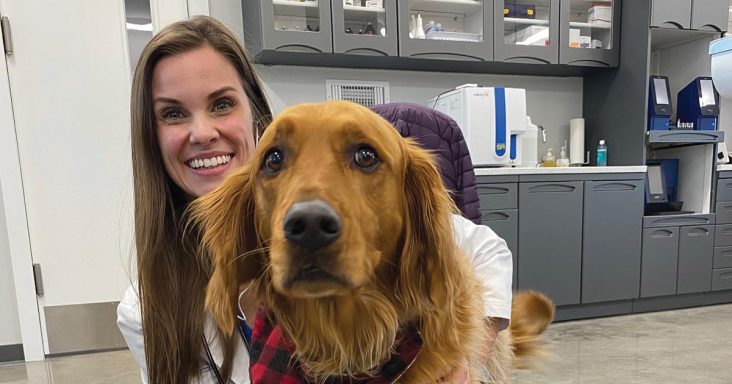In 30th year, Rogers animal hospital in growth mode
by September 20, 2021 9:32 am 1,065 views

Dr. Lindy O'Neal is a co-owner of Animal Medical Center of Rogers.
Animal Medical Center (AMC) of Rogers, a full-service hospital offering various services from surgeries to preventative care, built a second location that opened in June 2020. One of the three partners said it was pretty scary opening a pet hospital amid a pandemic. Still, the business’ performance in the first year confirmed the decision to expand.
AMC revenue has doubled since opening the second location. The business averaged 95 new clients per month and between 20 and 30 patients per day per doctor. Those numbers were before AMC acquired Animal Clinic of Rogers on July 1 this year. Dr. Lindy O’Neal said AMC now sees upwards of 200 new clients per month.
“We’ve had year-over-year growth every single month since we’ve been open [at the second location],” O’Neal said.
O’Neal and Drs. Dwaine Dickey and Kyle Fugett own AMC, located at 205 S. 20th St. and the new hospital at 1203 S. 43rd St., just east of South Promenade Boulevard. Twenty-two staff members support the three doctors, and O’Neal said they are hiring for more positions.
Dickey started AMC in 1991. O’Neal and Fugett bought in as partners in 2019 and 2018, respectively, and all three own the practice and real estate at the new building.
O’Neal, an Arkansas Veterinary Medical Association board member, said the second office is about 6,000 square feet, much larger than the original location’s 1,700 square feet.

The new location has larger reception and waiting areas, five examination rooms, two treatment tables, a surgery suite and a dental suite.
As pet ownership grew sharply in the past year, O’Neal said so did the workload at AMC. According to the American Pet Products Association, 11.3 million households in the U.S. got pets during the pandemic.
“Not just workload, but in puppies,” she said. “You think of shelter dogs as being older dogs, but we see many puppies, too. So many that we’ve increased the number of puppy packets we’re getting from our vendors so that we can service those dogs.”
